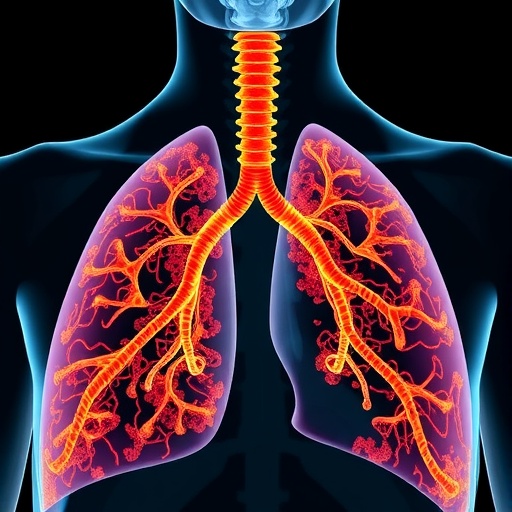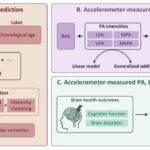
In the relentless quest to improve outcomes for non-small cell lung cancer (NSCLC) patients, a groundbreaking study has unveiled a novel prognostic model that could revolutionize how clinicians predict disease recurrence following surgery. Researchers from a multi-institutional team have developed and validated a DNA methylation-based scoring system poised to identify high-risk patients with unprecedented accuracy. This advancement not only promises to refine postoperative care but also heralds a new era of personalized oncology interventions grounded in epigenetic insights.
Lung cancer remains a formidable adversary in oncology, with NSCLC accounting for the majority of cases. Despite advances in surgical techniques and perioperative management, postoperative recurrence continues to challenge long-term survival. Traditional staging and molecular markers, while informative, have shown limitations in predicting which patients may experience relapse. Addressing this critical gap, the research focused on the epigenetic landscape—a layer of regulation above the genome that influences gene expression without altering DNA sequences.
The team initiated their investigation by assembling a tissue DNA methylation cohort comprising 73 patients diagnosed with stage I to III NSCLC, all of whom had undergone surgical resection. This discovery set served as the foundation for developing a model centered on recurrence-free survival (RFS), a vital clinical endpoint representing the interval during which a patient remains free of cancer post-surgery. Employing advanced statistical and machine learning techniques, notably the least absolute shrinkage and selection operator (LASSO), they identified key differentially methylated regions (DMRs) indicative of recurrence risk.
.adsslot_dvMs9qOZ8J{width:728px !important;height:90px !important;}
@media(max-width:1199px){ .adsslot_dvMs9qOZ8J{width:468px !important;height:60px !important;}
}
@media(max-width:767px){ .adsslot_dvMs9qOZ8J{width:320px !important;height:50px !important;}
}
ADVERTISEMENT
The culmination of this approach was the establishment of the Early to Mid-term NSCLC Recurrence LASSO (EMRL) score, a composite biomarker signature encompassing five pivotal DMRs. This score was rigorously tested in an independent validation cohort of 30 patients within the same clinical stages, confirming its prognostic robustness. Crucially, the EMRL score demonstrated a statistically significant association with RFS, yielding compelling survival stratifications with a log-rank p-value of 0.00032, underscoring its predictive validity.
Beyond mere association, multivariate Cox regression analyses situated the EMRL score as an independent prognostic factor. With a hazard ratio (HR) of 0.35 and a narrow 95% confidence interval ranging from 0.20 to 0.61, the model confidently predicts a reduction in recurrence risk for patients characterized by specific methylation profiles. This independence from conventional clinical parameters, including tumor-node-metastasis (TNM) staging, elevates the EMRL score as a standout tool for individual risk assessment.
A particularly striking finding was the model’s capacity to discern high-risk individuals even within identical TNM stages—a traditionally coarse measure of disease extent. By revealing epigenetic heterogeneity overlooked by anatomical staging, the EMRL score refines prognostic precision and facilitates tailored postoperative surveillance strategies. This nuance could profoundly influence clinical decision-making, enabling more aggressive follow-up or adjuvant therapies for those flagged as high-risk.
Moreover, the study examined subpopulations harboring mutations known to influence treatment responsiveness, including the epidermal growth factor receptor tyrosine kinase inhibitor (EGFR-TKI)-sensitive mutations. The model retained its predictive power within these genetically defined groups, highlighting its adaptability and potential integration with existing molecular diagnostics. Similarly, patients exhibiting positive programmed death-ligand 1 (PD-L1) expression, a critical biomarker for immunotherapy candidacy, were also stratified effectively by the EMRL score, highlighting its broad applicability across diverse biological backgrounds.
Underpinning this research is an appreciation for DNA methylation’s role as a dynamic and reversible epigenetic mark that modulates gene expression in cancer. Unlike genetic mutations, methylation changes offer a more plastic and potentially therapeutically targetable mechanism shaping tumor behavior. By focusing on methylation “blocks” rather than isolated sites, the model captures broader epigenomic alterations that more accurately reflect tumor biology and progression tendencies.
The implications of these findings extend well beyond prognostication. The EMRL score opens avenues for early, personalized interventions in the perioperative window, a critical period where therapeutic decisions have lasting ramifications. Patients flagged as high-risk could benefit from intensified surveillance, adjunctive therapies, or enrollment in clinical trials testing novel agents aimed at epigenetic modulation or immune enhancement. Conversely, low-risk patients might avoid overtreatment and its associated morbidities, adhering to more conservative follow-up protocols.
From a technical perspective, the study’s methodology embodies the forefront of bioinformatics in clinical oncology. Utilizing high-throughput methylation profiling coupled with LASSO regression—a penalized model fostering sparse and interpretable predictors—the researchers navigated the complexity of epigenetic data to generate a clinically actionable score. This fusion of computational rigor with translational intent exemplifies modern precision medicine’s ethos.
The robustness of the EMRL score was further underscored through multivariate models controlling for age, gender, smoking status, tumor stage, and other relevant covariates. Its consistency across diverse patient subgroups attests to widespread utility, potentially enabling stratification across institutions with varying demographic and molecular landscapes. Such generalizability is paramount for broad clinical adoption.
Critically, the study argues for integrating epigenetic biomarkers alongside genomic and proteomic data to develop multidimensional predictive frameworks. Lung cancer’s heterogeneity demands multifaceted approaches, and DNA methylation represents a crucial, underexploited dimension. By demonstrating its prognostic relevance, this work paves the way for incorporating methylation signatures into routine diagnostic workflows.
Looking forward, prospective trials are essential to validate EMRL’s utility prospectively and to assess its impact on clinical outcomes under real-world conditions. Furthermore, exploring whether therapeutic modulation of identified DMRs could alter recurrence trajectories might unlock novel intervention strategies. The convergence of epigenetics and immuno-oncology, particularly given PD-L1 context, offers fertile ground for such innovation.
In summary, this pioneering study advances our understanding of NSCLC recurrence by harnessing epigenetic biomarkers to predict patient trajectories after surgical resection. The development and validation of the EMRL score not only enrich the prognostic toolkit but also exemplify the transformative potential of integrating molecular insights into clinical care. As personalized medicine continues to evolve, such models will be instrumental in delivering more nuanced, effective, and patient-centered treatment paradigms that ultimately improve survival and quality of life for lung cancer patients worldwide.
Subject of Research: Prognostic DNA methylation biomarkers predicting recurrence in non-small cell lung cancer patients following surgery
Article Title: Identification and validation of a DNA methylation-block prognostic model in non-small cell lung cancer patients
Article References:
Li, H., Lu, Y., Chen, H. et al. Identification and validation of a DNA methylation-block prognostic model in non-small cell lung cancer patients.
BMC Cancer 25, 999 (2025). https://doi.org/10.1186/s12885-025-14382-8
Image Credits: Scienmag.com
DOI: https://doi.org/10.1186/s12885-025-14382-8
Tags: disease recurrence predictionDNA methylation modelepigenetic cancer researchhigh-risk patient identificationlung cancer prognosismolecular markers limitationsmulti-institutional research collaborationnon-small cell lung cancerpersonalized oncology interventionspostoperative care improvementsrecurrence-free survival modelsurgical outcomes for lung cancer



